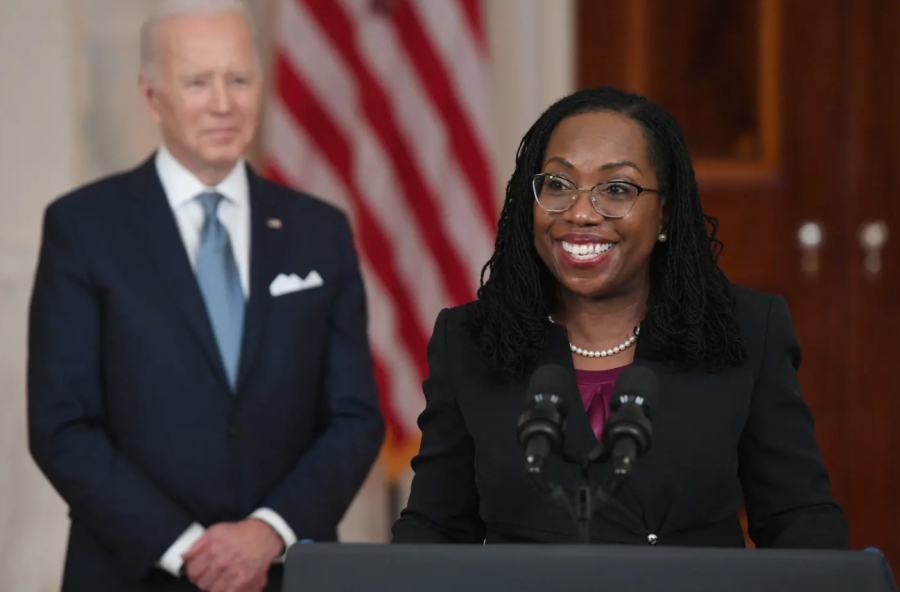Students cheer for Jackson, first Black woman on top Court
Judge Ketanji Brown Jackson becomes first Black woman to serve as a U.S. Supreme Court Justice
April 16, 2022
Concluding in a 53-37 vote, the United States Senate confirmed its first Black woman supreme court justice on April 7, 2022.
Judge Ketanji Brown Jackson was born in Washington, D.C. and grew up in Miami, Florida. She not only will become the first Black woman on the Supreme Court, but she will also be the first ever public defender; diversifying the court’s racial identity as well as their professional identity.
In light of her nomination, Judge Jackson has attributed her love for law from her times watching her father obtain his law degree while Jackson was in preschool. Throughout her high school career, Jackson was a high achiever. She was elected mayor of Palmetto Junior High and student body president of Miami Palmetto Senior High School.
Despite experiencing inevitable racial-based prejudice, Jackson only continued to exceed the standards. She graduated magna cum laude from Harvard University and proceeded to attend Harvard Law School, graduating cum laude and acting as an editor for the Harvard Law Review.
Professionally she has held three clerkships with federal judges and from 2005-2007 she has held office as a federal public defender. Since then she has served as a judge in the U.S. District Court for the District of Columbia Circuit.
In her time as the first Black woman confirmed to the Supreme Court, Jackson is anticipated to be met with inevitable hardship in a court dominated by a majority six Republican appointees. Preceding her official affirmation as judge, seated Republicans attempted to impede her nomination, labeling Jackson as a “liberal extremist who had coddled criminals.” However, despite these partisan efforts, Jackson was able to gain the support of three Republicans: Senator Mitt Romney of Utah, Susan Collins of Maine, and Lisa Murkowski of Alaska.
The narrow vote depicts the nature of the political field in today’s times. Confirmations heavily fall along party lines. The democratic party strictly opposed former president Donald Trump’s nominee, Justice Neil M. Gorsuch, and continued to do so for Justice Brett M. Kavanaugh and Justice Amy Coney Barrett. The republican party abhors the confirmation of Jackson.
This rejection is depicted through the actions of the opposing republican members. In an argument against Jackson during the confirmation hearing Senator Mitch McConnell, republican minority leader stated, “When it came to one of the most consequential decisions a president can make, a lifetime appointment to our highest court, the Biden administration let the radicals run the show. The far left got the reckless inflationary spending they wanted. The far left has gotten the insecure border they wanted. And today, the far left will get the Supreme Court justice they wanted.” After the official confirmation, Senator McConnell was reported to have slowly walked out of the room. The other republican members shortly followed, leaving only half of the chamber left in celebration.
However, despite the disapproval towards Jackson, half of the chamber overwhelmed the room with joy. “Even in the darkest times, there are bright lights.” Senator Chuck Schumer, majority leader stated after the confirmation. He expressed how Jackson’s confirmation doesn’t solely impact the hearings held in the supreme court, but the lives of millions of kids who can benefit from such a role model. Derrick Johnson, the president of the N.A.A.C.P expressed his gratitude saying, “after weeks and weeks of racist, misogynistic and stomach-churning attacks, we cannot wait to finally call her Justice Jackson.”
Vice President Harris, another powerful trailblazer in the political field, openly expressed her support, telling reporters, “I’m overjoyed, deeply moved. There’s so much about what’s happening in the world now that is presenting some of the worst of this moment and human behaviors. And then we have a moment like this.” These words of opposing party members juxtaposed against the words of democratic leaders such as Harris reflect how far the nation has until political unity can be achieved. However, despite this sobering depiction of strong political bipartisanship, there is no argument that Jackson’s confirmation is largely historical, and will be celebrated by many.



